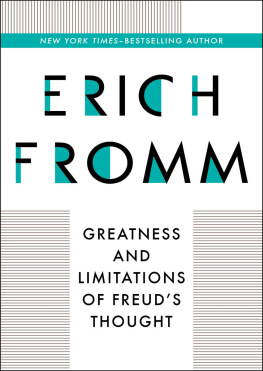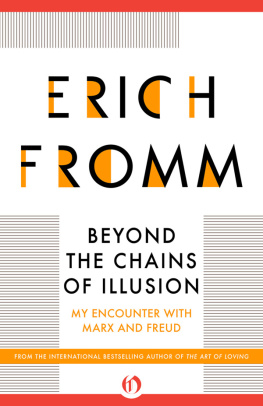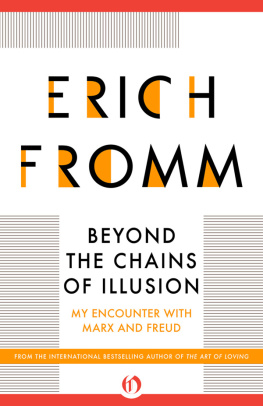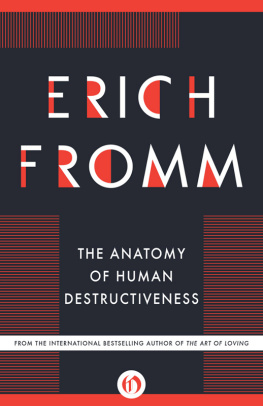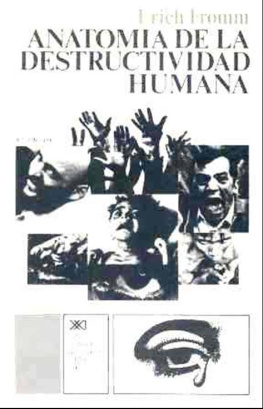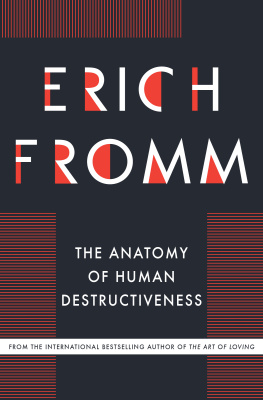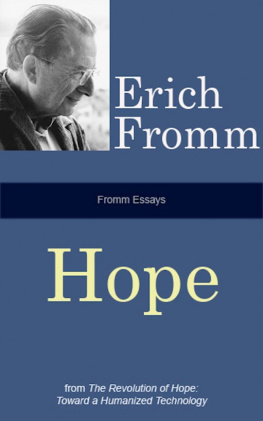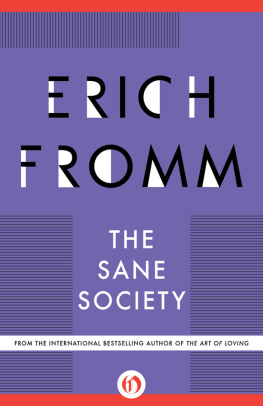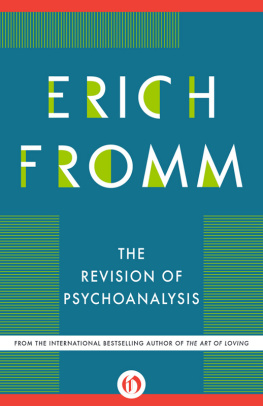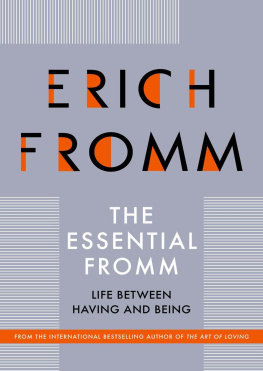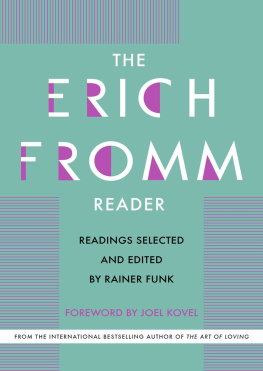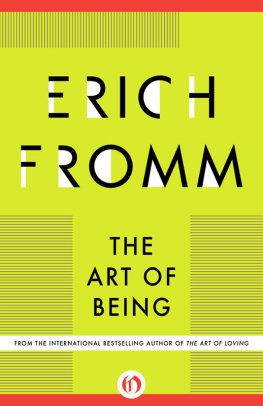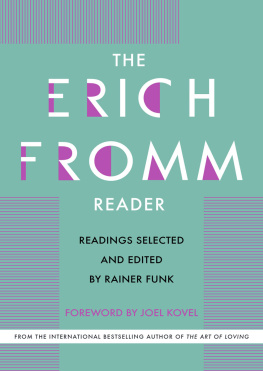Erich Fromm - Greatness and Limitations of Freuds Thought
Here you can read online Erich Fromm - Greatness and Limitations of Freuds Thought full text of the book (entire story) in english for free. Download pdf and epub, get meaning, cover and reviews about this ebook. City: New York, year: 1979, publisher: Open Road Media, genre: Science. Description of the work, (preface) as well as reviews are available. Best literature library LitArk.com created for fans of good reading and offers a wide selection of genres:
Romance novel
Science fiction
Adventure
Detective
Science
History
Home and family
Prose
Art
Politics
Computer
Non-fiction
Religion
Business
Children
Humor
Choose a favorite category and find really read worthwhile books. Enjoy immersion in the world of imagination, feel the emotions of the characters or learn something new for yourself, make an fascinating discovery.
- Book:Greatness and Limitations of Freuds Thought
- Author:
- Publisher:Open Road Media
- Genre:
- Year:1979
- City:New York
- Rating:3 / 5
- Favourites:Add to favourites
- Your mark:
- 60
- 1
- 2
- 3
- 4
- 5
Greatness and Limitations of Freuds Thought: summary, description and annotation
We offer to read an annotation, description, summary or preface (depends on what the author of the book "Greatness and Limitations of Freuds Thought" wrote himself). If you haven't found the necessary information about the book — write in the comments, we will try to find it.
Greatness and Limitations of Freuds Thought — read online for free the complete book (whole text) full work
Below is the text of the book, divided by pages. System saving the place of the last page read, allows you to conveniently read the book "Greatness and Limitations of Freuds Thought" online for free, without having to search again every time where you left off. Put a bookmark, and you can go to the page where you finished reading at any time.
Font size:
Interval:
Bookmark:

EARLY BIRD BOOKS
FRESH EBOOK DEALS, DELIVERED DAILY
LOVE TO READ ?
LOVE GREAT SALES ?
GET FANTASTIC DEALS ON BESTSELLING EBOOKS
DELIVERED TO YOUR INBOX EVERY DAY!


In order to appreciate fully the extraordinary significance of Freuds psychoanalytic discoveries, one must start out with understanding the principle on which they are based, and one cannot express this principle more adequately than through the sentence of the Gospels And the truth shall make you free (John 8:32). Indeed, the idea that the truth saves and heals is an old insight which the great Masters of Living have proclaimednobody perhaps with such radicalism and clarity as the Buddha, yet it is a thought common to Judaism and Christianity, to Socrates, Spinoza, Hegel and Marx.
For Buddhist thought, illusion (ignorance) is, together with hate and greed, one of the evils of which man must rid himself if he does not want to remain in a state of craving which necessarily causes suffering. Buddhism does not combat joy or even pleasure in the world, provided it is not the result of craving and greed. The greedy man cannot be a free man and cannot be a happy man. He is a slave of things which rule him. The process of waking up from illusions is the condition of freedom and of liberation from suffering which greed necessarily produces. Disillusion (Ent-tuschung) is a condition for leading a life which comes closest to the full development of man, or in Spinozas words, to the model of human nature. Less central and radical, because tainted with the idea of a God-idol, is the concept of truth, and the need for disillusionment in the Christian and Jewish traditions. But when these religions compromised with power, they could not help betraying truth. In the revolutionary sects, truth could have a prominent place again because their whole thrust was that of uncovering the contradiction between Christian thought and Christian practice.
Spinozas teachings in many ways resemble those of the Buddha. The human being who is carried away by irrational drives (passive affects) is necessarily one who has inadequate ideas about himself and the worldthat is to say, one who lives with illusions. Those who are guided by reason are the ones who have ceased to be seduced by their senses and follow the two active affects, reason and courage. Marx is in the tradition of those for whom truth is the condition for salvation. His whole work was not primarily that of showing a picture of how the good society would look, but was a relentless critique of illusions which prevent man from building the good society. As Marx put it, one must destroy illusions in order to change circumstances which require illusions.
Freud could have formulated the same sentence as a fitting motto for a therapy based on psychoanalytic theory. He enlarged the concept of truth tremendously. For him truth referred not only to what one believes or one thinks consciously, but also to what one represses because one does not wish to think it.
The greatness of Freuds discovery consists in the fact that he conceived a method of arriving at the truth beyond that which an individual believes to be the truth, and he could do that due to having discovered the effects of repression, and correspondingly, rationalizations. He demonstrated empirically that the way to cure lies in insight into ones own mental structure and thereby in de-repression. This application of the principle that truth liberates and cures is perhaps the greatest achievement of Freud, even though his application of this principle underwent many distortions and often produced new illusions.
In this book I want to present the most important discoveries of Freud, in detailed form. At the same time I shall try to show where and in what way bourgeois thought, so characteristic of Freud, narrowed down and sometimes even obscured his discoveries. Since my critique of Freud has its own continuity, I cannot avoid referring back to earlier statements I have made on the subject.
ERICH FROMM
The attempt to understand Freuds theoretical system, or that of any creative systematic thinker, cannot be successful unless we recognize that, and why, every system as it is developed and presented by its author is necessarily erroneous. That is so not because of the lack of ingenuity, creativeness or self-criticism on the part of the author, but because of a fundamental and unavoidable contradiction: on the one hand the author has something new to say, something that has not been thought or said before. But in speaking of newness one places it only into a descriptive category which does not do justice to what is essential in the creative thought. The creative thought is always a critical thought because it does away with certain illusion and gets closer to the awareness of reality. It enlarges the realm of mans awareness and strengthens the power of his reason. The critical and hence creative thought always has a liberating function by its negation of illusory thought.
On the other hand the thinker has to express his new thought in the spirit of his time. Different societies have different kinds of common sense, different categories of thinking, different systems of logic; every society has its own social filter through which only certain ideas and concepts and experiences can pass; those that need not necessarily remain unconscious can become conscious when by fundamental changes in the social structure the social filter changes accordingly. Thoughts that cannot pass through the social filter of a certain society at a certain time are unthinkable, and of course also unspeakable. For the average person the thought patterns of his society appear to be simply logical. The thought patterns of fundamentally different societies are looked upon each by the other as illogical or plainly nonsensical. But not only logic is determined by the social filter, and in the last analysis by the practice of life of any given society, but also certain thought contents. Take for instance the conventional notion that exploitation among human beings is a normal, natural and unavoidable phenomenon. For a member of the Neolithic society in which each man and woman lived from his or her work, individually or in groups, such a proposition would have been unthinkable. Considering their whole social organization, exploitation of human beings by others would have been a crazy idea, because there was not yet a surplus to make it sensible to employ others. (If one person had forced another to work for him it would not have meant that the amount of goods would have increased, only that the employer would have been forced to idleness and boredom.) Another example: the many societies that knew no private property in the modern sense but only functional property, like a tool, which belonged to a single person inasmuch as he used it but was readily shared with others when needed.
What is unthinkable is also unspeakable and the language has no word for it. Many languages do not have a word for to have but
It follows that the creative thinker must think in the terms of the logic, the thought patterns, the expressible concepts of his culture. That means he has not yet the proper words to express the creative, the new, the liberating idea. He is forced to solve an insoluble problem: to express the new thought in concepts and words that do not yet exist in his language. (They may very well exist at a later time when his creative thoughts have been generally accepted.) The consequence is that the new thought as he formulated it is a blend of what is truly new and the conventional thought which it transcends. The thinker, however, is not conscious of this contradiction. The conventional thoughts of his culture are unquestionably true for him and hence he himself is little aware of the difference between what is creative in his thought and what is purely conventional. Only in the historical process, when social changes are reflected in the changes of thought patterns, does it become evident what in the thought of a creative thinker was truly new and to what extent his system is only a reflection of conventional thinking. It is up to his followers living in a different frame of ideas to interpret the master by distinguishing his original thoughts from his conventional thoughts, and by analyzing the contradictions between the new and the old, rather than by trying to harmonize the immanent contradictions of his system by all kinds of subterfuge.
Next pageFont size:
Interval:
Bookmark:
Similar books «Greatness and Limitations of Freuds Thought»
Look at similar books to Greatness and Limitations of Freuds Thought. We have selected literature similar in name and meaning in the hope of providing readers with more options to find new, interesting, not yet read works.
Discussion, reviews of the book Greatness and Limitations of Freuds Thought and just readers' own opinions. Leave your comments, write what you think about the work, its meaning or the main characters. Specify what exactly you liked and what you didn't like, and why you think so.

